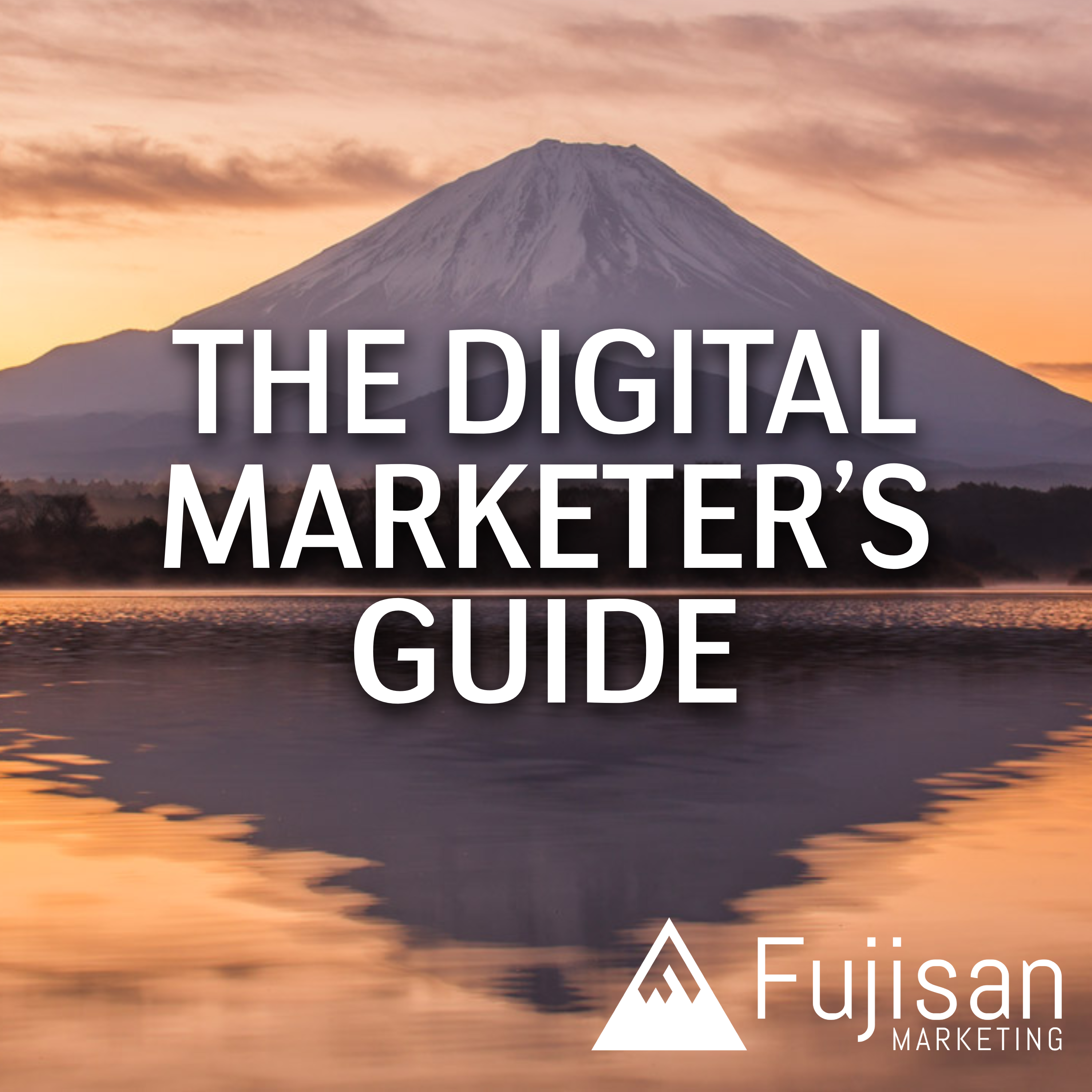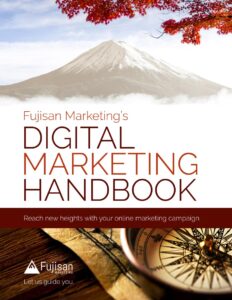It’s a long-held belief that, in SEO, content is king. In other words, your SEO program is only successful if you generate new, unique, engaging content on a regular basis. But is that still true? What changes have there been in recent years to the type of content that you should produce to maximize your SEO efforts. Samantha Pape joins us to talk about whether content is still king.
Learn more about Fujisan Marketing here or email your questions/comments to contact@fujisanmarketing.com.
Full episode transcript:
Preston Parshall 0:14
Welcome to the digital marketers guide podcast where we break down digital marketing topics into bite sized episodes that can help make your marketing program and you a little better. I’m Preston Parshall, the founder and CEO of Fujisan marketing. We’re here today with Samantha Pape to discuss is content still king. Samantha has been doing SEO for eight years and has been on our team for the last three years and is our foremost expert on SEO. Welcome to the show, Samantha.
Samantha Pape 0:41
Hello.
Preston Parshall 0:42
So Samantha, is content still important in the realm of SEO?
Samantha Pape 0:46
Yeah, absolutely. I think it would be totally remiss if you were to not have content as a part of your SEO strategy. The algorithms that Google and a lot of the leading SERPs out there have really closely aligned to content, the type of content that you’re pushing out, the ability for you to appear authoritative online, and a myriad of other things that all sort of drive into how trustworthy Google and other search engines view your site and the greater web and against your competitors.
Preston Parshall 1:19
What kind of content should I be creating to make an impact on my organic traffic?
Samantha Pape 1:23
The content you make should really be as relevant to your space as possible. So when you are discussing things like skincare, can you create content based on what type of skincare, are you focusing on Women who are 30 Plus, or you may be doing men’s exclusives, skin care, things like that focusing on your target audience, focusing on your product, and trying to weave it in as naturally as possible into your overall site’s content. Try not to make your content too salesy. Google does have a tendency to spam or rank things lower when you’ve been just spamming links all over the place internally, and try to weave in your products and other suggested services, as organically and as helpfully as possible without just jamming it in there to fit some sort of quota or agenda.
Preston Parshall 2:15
Can you give me a client example where you’ve seen it work extremely well?
Samantha Pape 2:18
Sure. So with one of my clients, I have seen a really great success behind their content strategy platform, just by going through and being consistent with it. So prior to our start with them, what was going on with their site was their strategy really was a little bit all over the place. They were really using their content tool as a way to either push out press releases, or announce awards that they had won, or to answer some really obscure questions that frankly, nobody was asking. So none of their stuff was reaching the people that they needed to reach. Our solution to that was to completely revamp their entire organic strategy and focus on keyword research, their core topics and themes and our core services that they offer and provide. We did that through a number of different means we focused on their topics and themes that were relevant to them, but also when they were trending throughout the year, and mapping out basically an entire 12 month editorial calendar for them that evolved from creating prolific amounts of content, usually four to six pieces of content per month. And what happened there was we took their visibility score, or how often they were ranking from about, I think about one or 2%, to nine to 10%, currently speaking. So that’s about a 740% increase in their visibility, just by pushing out content on a regular dedicated basis
Preston Parshall 3:55
That must have been one heck of a report call.
Samantha Pape 3:57
It really was and you know, I just spoke with him the other day, their leadership had their yearly annual meeting with them. And there aren’t really big proponents on organic or digital marketing at large on their leadership team. Luckily, our points of contact there are huge evangelists of it and have a great success story to tell now that we have completely changed everything.
Preston Parshall 4:22
So I’m always hearing SEO, it’s constantly changing, constantly changing. So has content changed or how you approach it in SEO and what are the current best practices?
Samantha Pape 4:33
I think that a lot of focus in the past was based on the most clickbatey, things you could possibly imagine getting into SERPs. So everybody remembers back in like the 2010s where BuzzFeed was pushing out listicle after listicle after listicle that doesn’t really happen anymore. listicles are definitely still relevant and I’ve seen some success with it on my clients websites as well. However, it’s not really focusing so much on specific keywords so much as it is focused on the overall topic or theme that you’re trying to hit nowadays and trying to get a holistic view on these topics and themes. Are you consistently writing about the same thing from different points of views from different facets from different perspectives over and over again? Are you telling people things about your industry or your services that they maybe not might not have thought of before, or reimagining things in a way that people wouldn’t normally imagine them to be? And that’s kind of what’s happening right now with content, especially with the advent of things like Voice Search and AI, Voice Search. In particular, there’s a huge push behind. Getting things more into longtail keywords, I think we all sort of adjust our language when we’re googling things to sort of make it into a phrase that’s as key worded and as relevant to the thought in our head as possible. But it isn’t the way that we organically speak or think we’re specifically putting a thing into Google that we think we’ll have them understand it. Whereas when we’re doing voice searches, and just speaking to our personal assistants and things of that nature, it really does take a more conversational tone. And getting and capturing those longtail keywords is going to be more important now than ever. And we’ll need to create and shape content around that.
Preston Parshall 4:42
So you get a new client, each one’s different. They have some have in house writers, some don’t some know what an editorial calendar is some don’t. How do you get a new client organized, especially with the state of marketing now and marketing departments having such different pieces?
Samantha Pape 6:48
Well, like you said, each client is different. So I’m going to take a different approach every time with the client that I mentioned previously, where I mapped out the last 12 months, they had a very robust content marketing team. on their end, they had a dedicated copywriter, and they had the time and the resources to actually facilitate a 12 month plan. Now, that being said, I would say 75% of our clients are so don’t really have that sort of capacity to push out four to six pieces of content per month. In those cases, what I like to do is sort of get with them plan out the next six months of content, typically only about a piece one or two pieces per month, and sort of gauge how they feel going off of that I still conduct all the same normal keyword research and trends research that I would normally do. It’s just on a much smaller scale.
Preston Parshall 7:39
Tell me a little bit more about keyword research. How are you incorporating that into your current clients content strategies.
Samantha Pape 7:45
So with keyword research, I am taking their core keywords and trying to expand that out as much as possible, we use a SEMrush tool here. And what that does is it lets me input my primary keyword in there. And then I’ll go through the list in their keyword research tool and see what other terms I can pull in that are still relevant and other ways that we can think about it. So for instance, if I was doing something like, again, skincare, and I would just type in as a very broad keyword skincare into the keyword list tool. what would then happen is myself seeing a bunch of different things in association with skincare, how do I take care of oily skin? How do I take care of dry skin? How do I take care of combo skin, all of those different things. And all of those are really great topics that are still tie back to the core products and services that the client has to offer. And each of those things in turn, help me further drive down my keyword research and expand out. So now I’ve taken a broad key keyword and turned it into a slightly longer one. And then I’ll keep working my way down from there until I find a topic that I think truly would resonate with our audience.
Preston Parshall 8:59
So you touched on a little bit earlier. But how will AI and voice search shape the future of SEO and content creation? Is it going to game the system,
Samantha Pape 9:07
it’s going to look a lot different moving forward. If you’ve tried out the new search generative experience within Google you’ll see that Google is essentially taking the content from websites and then facilitating it in a chat GPT type answer. And if you look back into Google’s history and what the founders have to say about their search engine, you realize that that was pretty much always the intent behind Google and what they’ve always been working towards. This basically means that your site and the content that’s within it is going to be used as a resource tool for Google’s search terms moving forward. Now how permanent their search generative experience or SGX is actually going to be I’m not totally certain how it’s going to look in the future. I’m not certain on that as well. I know Bard is taking much more precedence in their overall strategy and It’s interesting to see how they’re pulling in information. Now, that being said, your site may be impacted in terms of clicks, because of the way that Google is using it as a resource tool instead of driving traffic to it. However, if you’re providing some sort of captive tagline or something that makes people want to learn more about the information based on a quick, snappy piece of text that you’ve specifically optimized towards those experiences in Google, then hopefully you can encourage people to actually click into your site and drive traffic to you as opposed to them just staying in those the search engine results.
Preston Parshall 10:38
And how do you optimize for that?
Samantha Pape 10:40
There’s a number of different ways to do it, my recommendation would probably be to sort of front load that snappy answer right in the front. And then afterwards, there are a number of different things that you can leverage in terms of schema, there are some FAQ schemas that you could do, there are some other things that you could do to populate into the people also asked section that’s a little bit more obscure, and based on Google’s algorithms more than it is on schema, but I do believe that it’s tied in in some sort of way to their SGW.
Preston Parshall 11:12
Well, this podcast isn’t about schema, I guess, people are gonna have to wait. So what’s your final verdict? Is content still king?
Samantha Pape 11:18
Absolutely. There’s no way around it. Unfortunately, content is always going to be at least a one part of Google’s search algorithm. And I don’t think there’s a way to get around that for now. Especially if you’re trying to draw in new audiences content is a fantastic way to do that. And if you’re trying to expand out and create brand awareness content is another way to do that. If you’re trying to build your up your authority and gain more backlinks, again, content is the way to do that. So it fits a lot of different facets of your SEO strategy, and it’s definitely not something that you should miss out on.
Preston Parshall 11:56
Thanks, Samantha. And thank you for listening to the digital marketers guide podcast. Be sure to subscribe to stay up to date when a new episode is released. If you have any feedback or topics you’d like to see covered, email us at contact@FujisanMarketing.com or learn more about us at FujisanMarketing.com. See you next time.




